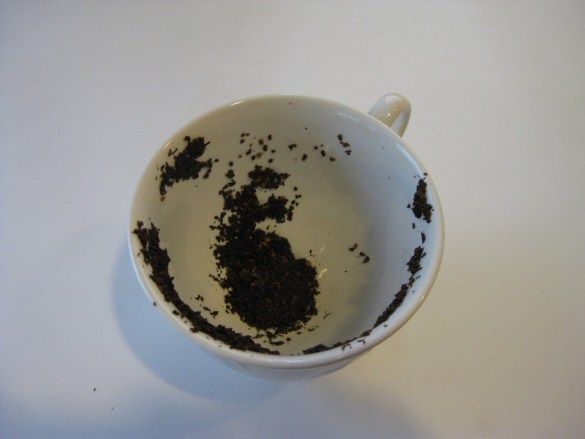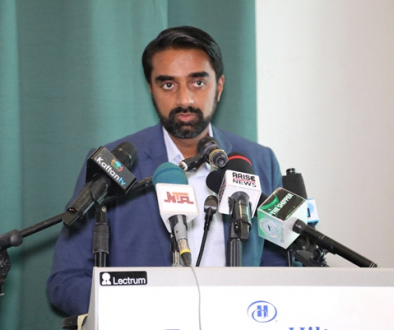Reading the Tea Leaves
 Nigeria’s private sector does not need to indulge in the ancient art of tasseography to foretell that the emerging pattern of President Buhari’s anti-graft war carries a distinct prophesy for them as well. There is indeed a new Sheriff in town, and it is appearing more and more unlikely that it will remain business as usual.
Nigeria’s private sector does not need to indulge in the ancient art of tasseography to foretell that the emerging pattern of President Buhari’s anti-graft war carries a distinct prophesy for them as well. There is indeed a new Sheriff in town, and it is appearing more and more unlikely that it will remain business as usual.
The dire financial straits that Nigeria is in can be inferred from the knee-jerk policies reeling off the operating table of the Central Bank of Nigeria – a most unfortunate mid-wife of our times, struggling to revive what many increasingly fear may be still born directions they are taking the economy. An angry regime, realizing a systematic attempt by a very corrupt cabal to turn the people’s hard fought mandate into something of a pyrrhic victory, now seems out to ensure that they change the way things are done around here, vowing strict punishment for all concerned.
Many have accused the President of being “slow” forgetting that the stealth with which a tiger moves does must never be misinterpreted as cowardice – an enormous amount of work has been done and is being done in the background to enable the right kinds of preparations to be in place to set the right course for his administration as early as possible. One of such areas is the work that has now culminated in the announcement of a Presidential Advisory Committee on anti-corruption. The same “slow” approach seems almost by “magic” to have given rise to a situation where civil servants in many quarters are working more diligently than they have in the last sixteen or so years resulting in increased power generation, production of an appreciable quantity of refined petroleum products from the Kaduna refinery saving Nigeria $5.3m per day and renewed zeal and vigour from our anti-corruption agencies to list just a few things.
The President appears keenly interested in the sequence of processes involved in the production and distribution of looted funds. His spotlight is beamed on key actors within the supply chain of corruption and elements around the activities, which support that chain and areas within the rules that make that chain thrive. So for instance, he has directed that all outstanding audit queries be resolved within 30 days and thereafter must be replied within 24 hours. He has directed that a Treasury Single Account be operated, he has restructured the NNPC from which Nigerians believe a lot of funds leaked in the last six years, he has launched a probe into the diversion of $1bn meant for development of rail infrastructure, he has officially put Nigerians on notice he would soon start the trial of those who stole public funds.
However, it has also been announced that the administration is identifying banks through which the illicit funds have flowed and the destination countries as well. This is perhaps the clearest indication that all processes or activities by which stolen loot is disguised and exported to destination countries are unlikely to escape the hot gaze of this administration. It will not take a soothsayer to predict that the entire set of actors involved in the value chain of corruption in Nigeria should be worried by the “slow” but methodical approach of the Buhari administration. Professionals such as accountants, auditors, bankers, lawyers are key to the successful concealment, movement and delivery of looted funds once those stealing have perfected the internal supply chains needed to pry it from the public sources. In other words, it only stands to reason that the role of the private sector in the systematic looting of public funds in Nigeria will also be of interest to the regime.
The time is ripe for the private sector to hold a summit to examine the question of how to grow revenues sustainably whilst remaining compliant (not just in word and on paper but in practice) in the emerging new Nigeria. This is a time to fashion out how to access finance, markets and know-how in ways that set the sector free from the bonds and shackles of corruption and the corrupt. Since this administration will not tolerate corruption from regulatory bodies and is “slowly”, “silently” but definitely firmly demanding performance from public institutions, this is a great opportunity for the private sector to push for that “enabling environment” that eludes it and the absence of which makes a nonsense of their investments.
It would appear we are in a time of national renewal where those who do not subscribe to business models founded on corruption can step up to take the lead in their various sectors and use their levels of compliance as a tool to achieve strategic advantage in the current market place. There may well be a lull to business at the moment but it wont last forever so it is time to do what it takes to be well positioned for the upswing when it comes. Ribadu said, “when you fight corruption, corruption fights you back” so I expect it will be something of a roller coaster ride for Buhari’s anti-graft war however, now that the times of decay and largesse seem to have been paused, the private sector should look down into its cup and carefully read the tea leaves.


